Hi, the system in question is my EP35-DS3R/QX6700 system in my signature.
Three months ago it started shutting down spontaneously and making odd sparkling/crackling noises. I pulled out the Bluestorm 500w I was using at the time and noticed the AUX12V 4-pin connector by the CPU socket was blackened on one side of the cable connector (the side containing the two pins closest to the edge of the motherboard). I replaced that Bluestorm 500w power supply with an Epsilon 700w unit I had laying around and the problem was solved.
But last night it spontaneously shut down on me again, and when it was running I was hearing slight crackling noises from the area of the PSU again. I haven't pulled out the AUX12V connector to see if it is scorched yet, I'll do that tonight. For now I've turned the system off. I crunch rosetta@home on this computer full time so it is always under a full CPU load.
I need some help guys , how should I troubleshoot this problem? Of course I don't want to keep throwing PSUs at it if the board is in fact killing them (can a motherboard even kill a PSU?)
, how should I troubleshoot this problem? Of course I don't want to keep throwing PSUs at it if the board is in fact killing them (can a motherboard even kill a PSU?)
Thanks in advance.
Three months ago it started shutting down spontaneously and making odd sparkling/crackling noises. I pulled out the Bluestorm 500w I was using at the time and noticed the AUX12V 4-pin connector by the CPU socket was blackened on one side of the cable connector (the side containing the two pins closest to the edge of the motherboard). I replaced that Bluestorm 500w power supply with an Epsilon 700w unit I had laying around and the problem was solved.
But last night it spontaneously shut down on me again, and when it was running I was hearing slight crackling noises from the area of the PSU again. I haven't pulled out the AUX12V connector to see if it is scorched yet, I'll do that tonight. For now I've turned the system off. I crunch rosetta@home on this computer full time so it is always under a full CPU load.
I need some help guys
Thanks in advance.



